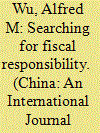|
|
|
Sort Order |
|
|
|
Items / Page
|
|
|
|
|
|
|
| Srl | Item |
| 1 |
ID:
133453


|
|
Big question: how much confidence do you have in your nation's banking system?
/ Lee, Ann; Pelagidis, Theodore; Fourie, Leila; Marques, Fernando, Ocampo, Jose Antonio, Antonini, Massimo, Naik, Prithvi, Britto, Neil
|

|
|
|
|
| Publication |
2014.
|
| Summary/Abstract |
The global banking system is the fundamental conduit of value within nations and across borders. Since the last global financial crisis, however, the role of banks as a repository of value has come increasingly into question. Today, with a fragile recovery in so much of the world, banks and those who manage and regulate them are under attack. We asked our panel of global experts how this crisis of confidence is playing out in their nation or region.
|
|
|
|
|
|
|
|
|
|
|
|
|
|
|
|
| 2 |
ID:
129637


|
|
|
|
|
| Publication |
2014.
|
| Summary/Abstract |
The global financial crisis (GFC) and subsequent Eurozone sovereign debt crisis (ESDC) have made reform of the global financial governance regime a priority for governments around the world. Prior to the crisis, neoliberal policies agreed between the European Union and the USA created a financial governance regime based on the principle of free operation of the market through the norms of market self-regulation, equal access to the market, and stability via institutional supervision. How will global financial governance look like after these crises? And what role can the EU and China play in shaping this regime? This article argues that as a result of the GFC and the ESDC, stability is becoming a second principle of global financial governance, along with the free operation of the market. Meanwhile, European and Chinese views regarding the norms, rules, and decision-making procedures designed to implement those principles do not differ as much as they used to. Thanks to interactions at the bilateral and multilateral levels, the EU and China now have knowledge regarding how the other understands the role and characteristics that financial governance should have. This is leading to convergence in some areas and cooperation in others. Concurrently, there are also areas of competition. Analysing all of these is essential to understand how global financial governance might evolve, given the central role that the EU and China now play in this regime.
|
|
|
|
|
|
|
|
|
|
|
|
|
|
|
|
| 3 |
ID:
130584


|
|
|
|
|
| Publication |
2014.
|
| Summary/Abstract |
The 2008-2009 global financial crisis has made budget management and fiscal responsibility more imperative in many developed economies. A budget crisis has not occurred in emerging economies such as China. However, in China, the demands of fiscal responsibility have increased against the backdrop of bulging government revenues in recent years. Over the past decade, the Chinese government has started to promote self-constrained bureaucracy and strengthen its fiscal responsibility and accountability in budget formulation and implementation. The 1999 budget reform that aimed to improve fiscal responsibility was hailed a success by previous literature. Drawing on field research in five counties in China between 2008 and 2010, it is argued that though some achievements have been made, the budget reform has not substantially improved both accountability and transparency within the bureaucracy. The implication of this study is that top-down, supply-side reforms led by the state may not be effective.
|
|
|
|
|
|
|
|
|
|
|
|
|
|
|
|
|
|
|
|
|